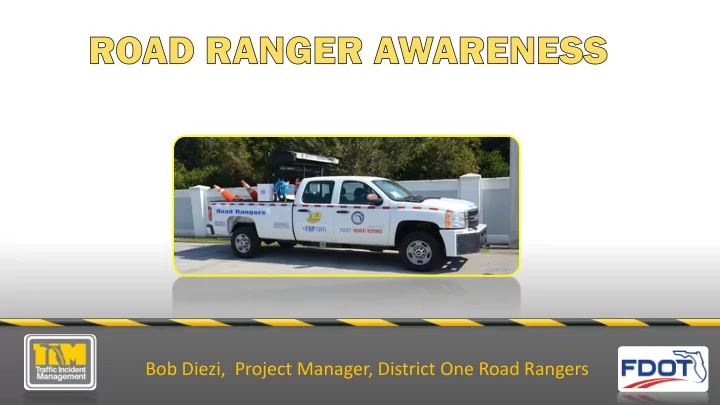

Bob Diezi, Project Manager, District One Road Rangers
Project Manager Responsibilities Point of contact for the Department Thoroughly knowledgeable and experienced in relation to all aspects of the scope of services and the contract Administrative authority Available 24/7 Respond within 30 minutes On scene in 60 minutes Participate in Traffic Incident Management (TIM) meetings Meet with the Department regularly
Two Hundred Center Line Miles of Roadway Collier = 63 Lee = 34 Charlotte = 22 Sarasota = 43 Manatee = 21 Manatee/Hillsborough/Pinellas = 17 Accounting for multi-lanes, both directions North and South, limited access entrance, and exit ramps The total roadway being patrolled closer to 1800 miles
SCHEDULES Two Road Rangers on patrol in each county Collier County Charlotte County Mile marker 49-105 Mile marker 136-170 24 hours , 7 days a week 6:00 a.m. – 7:00 p.m. on weekdays 8 hour shifts on weekdays 9:00 a.m. – 9:00 p.m. on weekends 12 hour shifts on weekends Lee County Mile marker 105-138 6:00 a.m. – 7:00 p.m. on weekdays 9:00 a.m. – 9:00 p.m. on weekends
SCHEDULES Sarasota County Mile marker 167-213 Sky Way Bridge I-275 6:00 a.m. – 7:00 p.m. on weekdays Mile marker 1-13 9:00 a.m. – 9:00 p.m. on weekends 7:00 a.m. – 7:00 p.m. on weekdays Manatee County 9:00 a.m. – 9:00 p.m. on weekends Mile marker 210-234 6:00 a.m. – 7:00 p.m. on weekdays 9:00 a.m. – 9:00 p.m. on weekends
Road Ranger Qualifications and Responsibilities Be competent in the task of operating the vehicles and in providing safe and proper execution of the services within the contract Speak and understand English fluently Provide documented automotive mechanical background Current F lorida Class “E” or higher classification along with 8 years of driving experience A safe driving record Minimum of 18 years of age Pass SLERS criminal record High school diploma or GED equivalent Drug free
Road Ranger Qualifications and Responsibilities – Con’t . Be well groomed, clean, and have neatly trimmed hair, including facial hair, if applicable No visible tattoos Wear required uniforms Be professional and courteous at all times Cannot consumed alcoholic beverage with-in 8 hours of shift and/or consume alcohol while on shift Cannot take tips, gifts or gratuity for services
Meet your Road Rangers for District One!
Training and Certifications Basic First Aid Certificate Cardiopulmonary Resuscitation (CPR) Training and Vendor Certification Use of equipment operations and road side maintenance safety procedures 40 hours of a “ride along” with an experienced Ranger Training on of part VI of the manual on Uniform Traffic Control Devices – Temp Traffic Control FEMA-Emergency Management Institute online certification IS-100 Introduction to Incident Command System IS-700 Introduction to National Incident Management System CJIS-Criminal Justice Information
Authorized Stops Assist law enforcement-DBI-ICA-FDOT with incident management Stranded motorist with minor repairs (15 Minutes) Remove disabled vehicle Remove debris non-hazardous spills from travel lane Abandon vehicle - initial check- Red Tag Complete Patrol Logs Refuel Road Ranger vehicle and containers Meal and restroom breaks
Standard Operating Guidelines Methods and activities Traffic incident detection, notification, and rapid response Assist motorists Improving safety Reducing congestion and economic delay Assist incident first responders and the scene of an event
Response Priority Injury crash blocking the travel portion of highway Non-injury crash blocking the travel portion of the highway Disabled vehicle blocking the travel portion of the highway Abandoned vehicle blocking the travel portion of the highway Emergency traffic control operations Debris blocking one or more travel lanes Crash not blocking any travel lane Disabled vehicle not blocking a travel lane Abandon vehicle not blocking but in questionable location
Do’s and Don’ts Do not take gratuity of any value or charge a fee Do not add engine oil to any vehicle Do attempt minor repairs Do not exceed 15 minutes in repair time Do provide water and shelter in road ranger vehicle Do transport motorist to safe location Do jump start vehicle Do change flat tries Do give no less than (1) gallon of fuel
Road Rangers Provide Drinking water Radiator water Make special efforts for persons with special needs NEVER Leave a motorist or responders in any abnormally unsafe or dangerous location
Authorized Equipment Truck mounted dynamic message sign Light bar-roof mounted On board computer-data collection/AVL system Ranger operator logs Move it law – informational cards provided both English and Spanish Abandon red (orange) tags
Road Rangers Train Together
Hurricanes and Other Services Make resources available for certain traffic maintenance request or as directed by the Department. Keep evacuation routes clear of debris and or disabled vehicles Fuel and water Keep all lanes open to include emergency lanes Own, operate and monitor NOAA radio and alarm equipment Continue patrol until FHP/Department determines unsafe for motorist to remain on the highway Expand contract relocate and or deploy coverage at the request of the department
Other Information It is important to note that a fully funded Road Ranger Program is dramatically less expensive than building additional lanes to increase capacity The cost to construct two new lanes for two miles is approximately $45 million and provides additional capacity only in that localized area. That same funding for the Road Rangers would benefit the entire intrastate highway system in Florida. The Road Ranger Incident Response Program fully supports the strategic mission of the Florida Department of Transportation and sound traffic incident management principles. Road Rangers Are Much More than “Schmucks with Trucks ”!!
Qu Questions? tions?
Recommend
More recommend